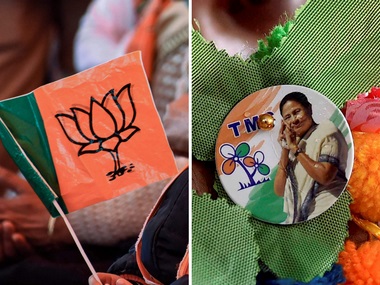What West Bengal is witnessing today, the rest of India already witnessed yesterday. The posit may sound a little trite, but is, sadly, true. While poll violence has become a thing of the past even in the Hindi belt — particularly Bihar, courtesy Nitish Kumar — West Bengal has accepted it as a sole tool to fight elections. The party in power in Bengal — which happens to be the Trinamool Congress — has always used muscle power and cunning manipulation to protect its turf. One thing is evident: Although political leaders are demonstrating a desperation to either grab power or to cling on to it all over the country, party workers are not taking part in the all-time low in the war of words that has divided India asunder. Neither are party workers getting involved in large-scale violence as they are in Bengal. The TMC is still not allowing voters in the districts to cast their votes — despite the presence of Central security forces — or leaders of rival parties to move freely in the state, or even stay and hold party meetings in hotels in Kolkata. It’s as if rules that govern electioneering and elections in the rest of India do not apply in Bengal. [caption id=“attachment_6536331” align=“alignleft” width=“380”] Representational image. News18[/caption] The reason: The stakes are unusually high for the two major contenders. The TMC cannot afford to let the BJP make inroads into Bengal, since the TMC’s only seat of power is in Bengal. Out of power in the state, the party will have no relevance, not only in Bengal but in the rest of India too. And without the revenue that comes from the state, there’s no saying whether the party will exist at all. In a televised district administrative meeting sometime ago, Mamata Banerjee openly chided a local TMC leader for cornering the largesse. “Don’t have everything alone. Share it with others,” she said. The party has already lost its ‘rebel’ character, which ironically even the financially and strategically superior Left establishment had not been able to destroy. The BJP, on the other hand, desperately needs to have a toehold in Bengal. In spite of its presence in the North, the Northeast and the West, it has hardly been able to make itself felt in West Bengal. But this time, as a myriad experts have already pointed out, it needs seats from Bengal for its ‘Plan B’ — if Uttar Pradesh disappoints, extra seats are needed from Bengal to compensate. Above all, the game of one-upmanship between Mamata and Modi has pushed both parties into a political trap where indulging in violence is essential simply to keep the flock together. Things have reached such a state of affairs that even national president of the BJP, Amit Shah, was not allowed permission to hold rallies. On one occasion, the owner of the plot on which Shah was supposed to hold his rally was forced to withdraw permission. But Shah, a veteran of many battles
was undaunted. What’s more, desperation has reached such heights that protocol, poll ethics or political niceties are being flung to the wayside. The ‘why’ lies in the way the parties — right from the CPM in its heyday — conduct themselves when in power. In fact, it’s the Left that showed the way by blurring the thin line between political leadership and the government. During the last few years of CPM rule in Bengal, the party had become such an all-powerful entity that the government, its bureaucrats and even ministers had no other option but to surrender before the party. It made a whole lot of middle-level and local leaders immensely powerful and they, in turn, created a huge class of beneficiaries, whose existence depended on the party being in power. The result is history. During the Singur and Nandigram uprisings, local leaders forced the party and, of course, the government to resort to violence against common people and persistently misled the government and even their own senior leadership. The reason, revealed later in the CPM’s assessment report — as a very senior CPM leader admitted to this writer — was that the local chieftains wanted to paint a picture that would keep the Kolkata-based apparatchiks happy — who never made any serious attempts to go to the grassroots and find out for themselves what was actually happening. The local leaders’ standing in the party depended on that. And they had to think about the huge army of cadres that gave them the real raw power. The Trinamool Congress, although originally a breakaway group of the Congress and notwithstanding its nationalist postures, essentially functioned in the style set by its predecessors in Bengal. Let us not forget that by the time the TMC was born, the last traces of the traditional centrist political culture had been almost scrubbed clean from Bengal’s political landscape. The only model that the TMC had to study was the Left’s ‘Give loyalty and take benefits’ model, which helped the TMC grow overnight into another immensely powerful, but blind, behemoth. It’s the same story playing out once again. People, especially those who can make a difference on poll days with guns and bombs, will go with only those who can take care of their need to earn a living. And only a ruling party leader can do that. The lower-level workers’ desperation does not really come from the need to help the party keep its sway over the state, but from the need to protect their livelihood. As long as the cycle continues, Bengal’s poll story will be repeated over and over again, no matter in which direction the rest of India goes.
What West Bengal is witnessing today, the rest of India already witnessed yesterday. The posit may sound a little trite, but is, sadly, true
Advertisement
End of Article


)
)
)
)
)
)
)
)
)



